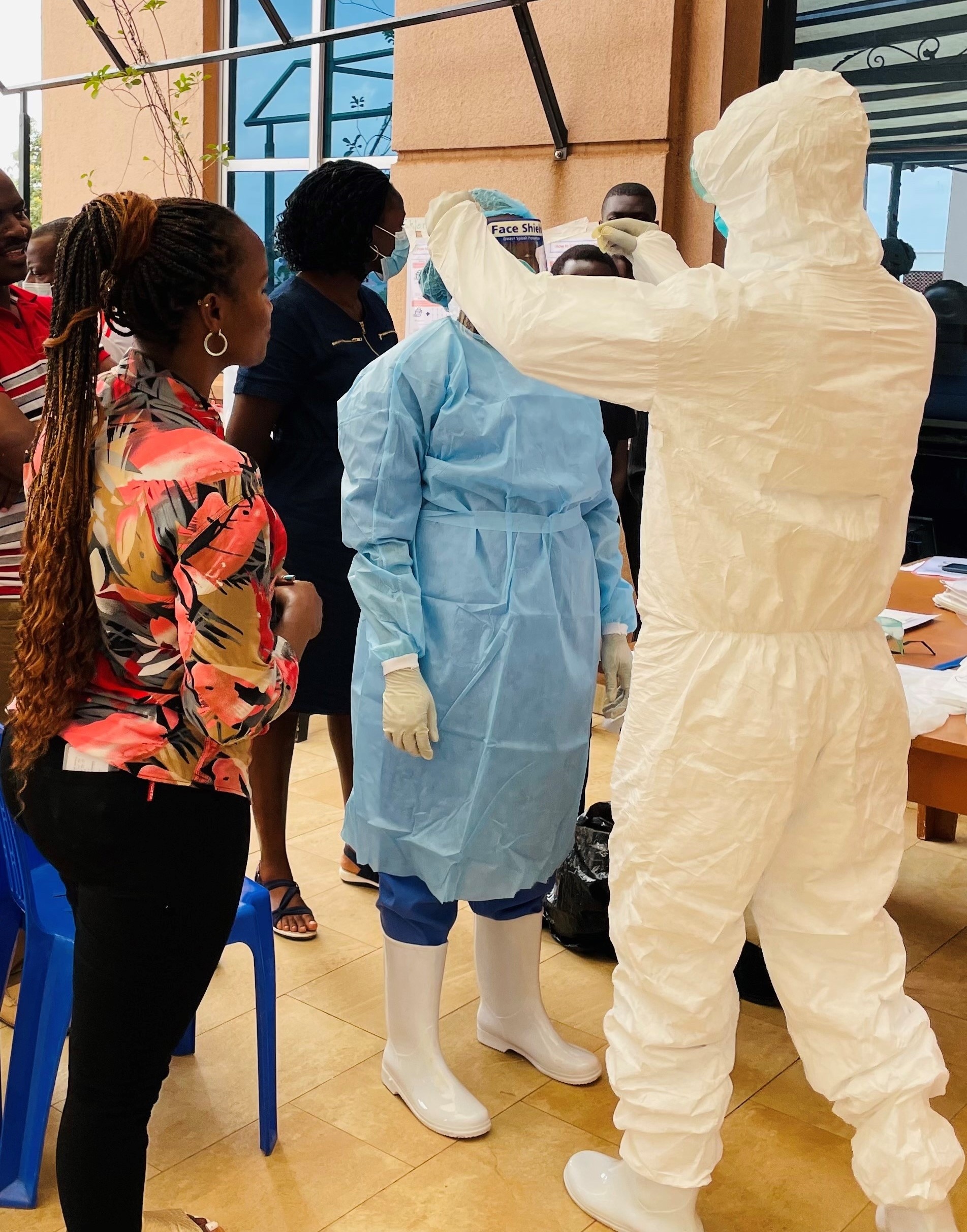Rapidly Respond to Healthcare Outbreaks Globally
When outbreaks include healthcare settings, they can spread rapidly and affect patients, healthcare workers, visitors, and the community. CDC’s International Infection Control Branch (IICB) works with partners to help countries prepare for healthcare outbreaks before they happen. If an outbreak does occur, IICB provides support to countries to investigate the outbreak and stop it from spreading.
Selected Outbreak Responses
- 2022: Uganda – Ebola
- 2021 – present: Multiple countries – mpox
- 2020 – present: Multiple countries – COVID-19 pandemic
- 2021: Guinea – Ebola
- 2021: Democratic Republic of the Congo – Ebola
- 2020: Dominican Republic – cosmetic surgery deaths
- 2019: Kenya – Candida auris; Klebsiella pneumoniae and Pantoea agglomerans
- 2018-2020: Democratic Republic of the Congo – Ebola
- 2018: India – Burkholderia cepacia
- 2018: Nigeria – Lassa fever
- 2017: Madagascar – pneumonic plague
- 2017: Fiji – multi-drug resistant Acinetobacter baumannii
- 2017: Panama – Candida auris
- 2016: Peru – symmetric gangrene
- 2016: Mongolia – measles
- 2016: India – colistin-resistant, carbapenem-resistant Klebsiella pneumonia (ColR-CRKP)
- 2015: Singapore – hepatitis C virus
- 2015: Saudi Arabia – Middle East Respiratory Syndrome (MERS)
- 2015: Republic of Korea – Middle East Respiratory Syndrome (MERS)
- 2014-2016: Sierra Leone, Liberia, and Guinea – Ebola

Training participants practice correct procedure for putting on full personal protective equipment with IDI staff member.
IICB and the CDC Uganda Country Office, in close collaboration with the Uganda Ministry of Health and the World Health Organization (WHO), worked jointly with the Infectious Diseases Institute (IDI) at Makerere University and the Kampala Capital City Authority in Uganda to advance infection prevention and control (IPC) efforts during an Ebola outbreak that began in Mubende district, Uganda in fall of 2022.
One key activity was training IPC focal points and other key healthcare workers across the Kampala metropolitan area of Uganda. IPC focal points serve as IPC leads for their respective facilities, training others and overseeing IPC activities, assessments, and improvements.
Over 700 healthcare workers across the region completed the two-day training, which provided a roadmap for facilities to navigate the Ebola outbreak. After returning to their home healthcare facilities, the healthcare workers continued learning through webinars.
These trained staff are better equipped to implement IPC measures in their facilities. They are also instrumental in training others to prevent and control the spread of Ebolaviruses. To further support these efforts, an Ebola IPC supervisor training program has been rolled out to allow for supportive supervision across multiple facilities.
During an Ebola outbreak, IPC training helps empower and protect healthcare workers. IPC activities also help prevent transmission of other infectious diseases in healthcare settings, potentially providing benefits long after the Ebola outbreak is over.
IICB’s Role in the Global COVID-19 Response
In response to the COVID-19 pandemic, IICB has provided direct assistance to 26 countries and collaborated with 58 partner organizations to strengthen IPC capacity and surveillance for COVID-19 in healthcare facilities. IICB hopes to sustain and accelerate the progress made during the COVID-19 response to create sustainable healthcare safety and IPC programs for healthcare workers and patients.
Some examples of IICB’s work with partners include:
- Developing COVID-19 IPC operational considerations and training materials to help contain and prevent COVID-19 in healthcare facilities in non-US settings.
- Collaborating with the World Health Organization and the Pan American Health Organization to develop COVID-19 IPC guidance.
- Developing an IPC assessment and implementation action package for healthcare facilities to better respond to COVID-19.
- Completing IPC assessments in over 770 facilities in Kenya.
- Leading or supporting studies of SARS-CoV-2, the virus that causes COVID-19, in 7 countries (Brazil, Peru, Ethiopia, Thailand, Jordan, Philippines, Indonesia) to investigate various aspects of SARS-CoV-2 in healthcare workers including prevalence of and risk factors for getting SARS-CoV-2, vaccine effectiveness, and variant distribution.
- Leading a global webinar series at the beginning of the COVID-19 pandemic that brought over 1,000 IPC professionals and subject matter experts together in the fight against COVID-19.
- Providing expert commentary to the Africa CDC IPC COVID-19 webinar series.
- Supporting delivery of COVID-19 IPC virtual trainings to over 16,100 healthcare workers in more than 1,520 healthcare facilities in 5 countries.



